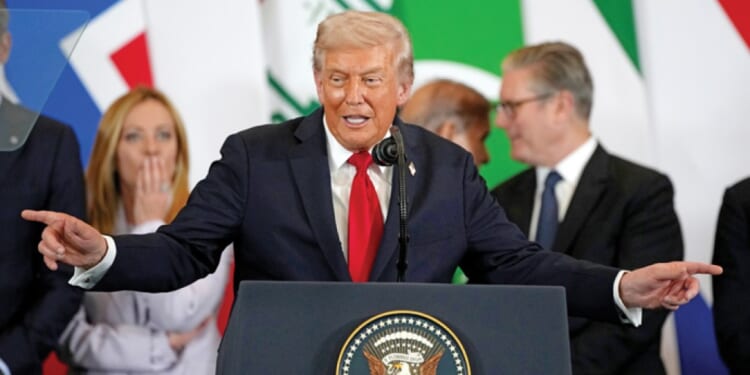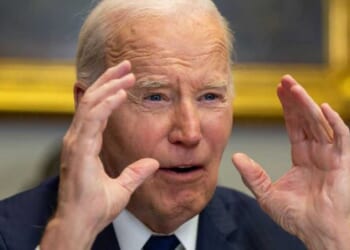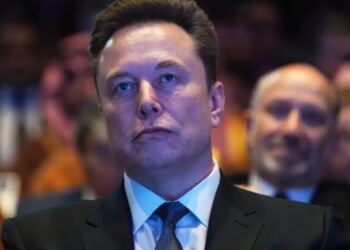The two-year war that Hamas began on Oct. 7, 2023, is over. As with the 12-day war between Israel and Iran in June 2025, the United States backed its ally, called time on the fighting, and shaped a decisive victory. Israel fought a war on seven fronts and achieved all of its war aims: the return of its hostages, the destruction of Hamas as a military force, and international agreement on excluding Hamas from Gaza’s postwar governance. President Donald Trump has restored American primacy in the Middle East. The U.S. is once again the regional arbiter in the center of the global chessboard.
“This is not only the end of a war, this is the end of an age of terror and death, and the beginning of the age of faith and hope and of God,” Trump told Israel’s parliament in Jerusalem on Oct. 13. “It’s the start of a grand concord and lasting harmony for Israel and all the nations of what will soon be a truly magnificent region. I believe that so strongly. This is the historic dawn of a new Middle East.”
While Israelis celebrated the recovery of the last 20 living hostages from 738 days of torture in Hamas captivity, and Palestinians in Gaza celebrated the release of 250 terrorists serving life sentences and another 1,700 post-Oct. 7 security threats, Trump flew to the Egyptian resort of Sharm el Sheikh for a press conference called the Peace Conference.
Sharm offensive
Most of the peacemakers had provided material or political support to Hamas during the war. Turkey and Qatar had openly backed Hamas and negotiated on its behalf. Apart from Prime Ministers Giorgia Meloni of Italy and Viktor Orban of Hungary, the European states had disgraced themselves. Britain, France, Canada, and Australia had sanctioned Israel for defending itself, abetted a global campaign of delegitimization by deferring to the kangaroo verdicts of international courts, and then, when it was clear that Israel was going to win, recognized an imaginary Palestinian state.
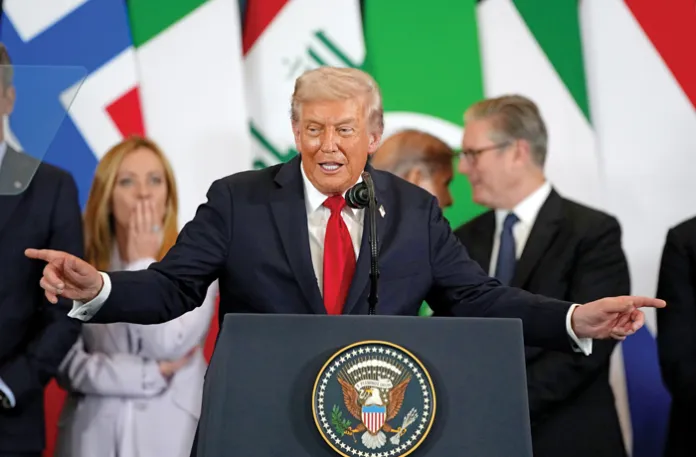
The prize for unhinged grandstanding to a domestic audience goes to Pedro Sanchez of Spain. The corruption-wracked socialist prime minister regretted his country’s inability to threaten Israel with nuclear weapons. Sanchez was among the 27 representatives who hurried to Sharm el Sheikh and avowed their love of peace. They included leaders from eight Muslim states (Egypt, Turkey, Qatar, Jordan, Kuwait, Bahrain, Indonesia, and Azerbaijan) plus Mahmoud Abbas, the addled kleptocrat who leads the Palestinian Authority. The major and minor Europeans were there, as well as unelected nonentities such as the head of FIFA, the global soccer federation, and a small gray man who claimed to be the prime minister of Canada.
Only Trump can convene so many leaders at short notice. Israeli Prime Minister Benjamin Netanyahu was not there. Rumor had it that he was invited that morning, then disinvited at Turkish President Recep Erdogan’s insistence. Netanyahu’s people insisted that he wasn’t going anyway: The summit overlapped with this year’s Simchat Torah, and Israeli prime ministers avoid travel and work on religious holidays. Another key player in what happens next, Saudi Arabia’s Crown Prince Mohammed bin Salman, was also missing.
That left Trump as the only winner. He enjoyed his victory lap. After the servile prime minister of Pakistan had nominated him for a Nobel Prize, Trump ran through the guest list in the style of Michael Corleone reconciling the feuding families. For my Arab friends who respect strength, my praise. For my Western friends who have shown no respect, my contempt. The Europeans looked petrified as Trump’s ad-libs fluctuated between affection and menace. French President Emmanuel Macron was smart enough to stay off the stage, but Britain’s hapless Keir Starmer had positioned himself at Trump’s shoulder. Trump invited Starmer up to the microphone and then sent him back before he could speak.

Trump held a piece of paper with a 20-point plan for the American-led, internationally financed reconstruction of Gaza. Trump is the chairman of the venture’s Board of Peace. “I’m not talking about single state or double state or two state,” he explained. “We’re talking about the rebuilding of Gaza.” It was only ever business.
Trump’s “Sharm offensive” redefines America’s position on the Israeli-Palestinian conflict and how it fits into America’s regional strategy. The ceasefire and the exchanges of hostages and prisoners are only the first stage. The next 19 steps set out the disarmament of Hamas, the creation of an international security force in coordination with Israel, the rebuilding of Gaza, the reconstruction of Gazan society under new political leadership, and a further round of Abraham Accords. If they include an Israel-Saudi Arabia deal, a rapprochement that the Oct. 7 attacks were intended to prevent, then Trump really will have created a new Middle East.
Shock and awe
“My first reaction to the 20 points was one of shock and awe,” Michael Oren told me the next day. Oren, an Israeli-American historian, was Israel’s ambassador to the court of then-President Barack Obama and then was a deputy minister under Netanyahu. “I’ve taught diplomatic history,” Oren said. “This is a work of diplomatic elegance and complexity. I don’t remember an example like it. They basically overturned every assumption about Middle East peacemaking diplomacy that had been regnant for almost the last 60 years.”
Nearly 60 years ago, Israel’s battlefield triumph in the Six-Day War of 1967 confirmed the Jewish state as a viable and powerful regional force. The Six-Day War, Oren told me, was a “great victory” in which Israel “achieved all its goals as far as they could be achieved.” After the war, however, Israel’s antagonists, notably Egypt’s Gamal Abdel Nasser, retained power. Arab rejectionism and Soviet antagonism prevented Israel and the United States from converting Israel’s military success into diplomatic and strategic breakthroughs.
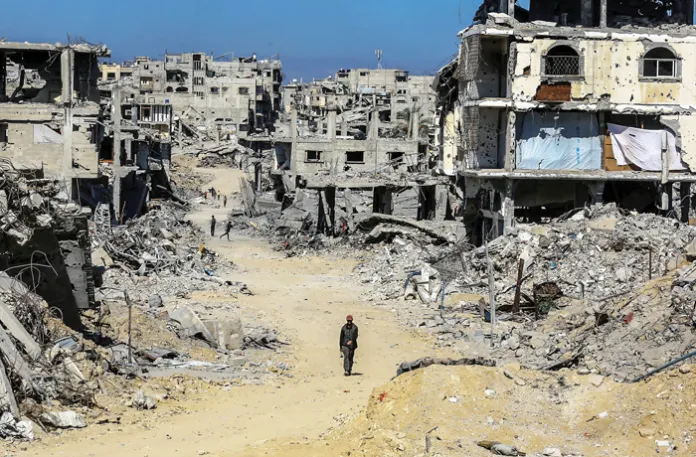
“I think militarily this is a bigger victory,” Oren said, “and I think, potentially, it could be more, far more transformative, diplomatically.” Israel could not have fought its corner so successfully without full American support, but it could not have won a multifront war without its own deep reserves of skill and grit.
Iran encircled Israel with its proxies, but Israel demolished this “ring of fire.” Hamas is shattered. Hezbollah, the flower of the Islamic resistance, is demolished in Lebanon. Its ally, the Syrian dictator Bashar Assad, was toppled and is hiding in Moscow. The Houthis of Yemen are on the back foot. Iran has played the spoiler for years, not least by killing American servicemen in Iraq and supplying and training Hamas in Gaza, but the Iranian nuclear program is in ruins. The influence of the Europeans has never been lower.
“I looked at Starmer and Macron sitting there in Sharm el Sheikh, and it was cringeworthy,” Oren said. “They did nothing to end this war. They did everything to prolong the war. And they should be ashamed. They should have been kept out.” Oren also dismissed claims from ex-Secretary of State Antony Blinken and other Democrats that Trump’s deal merely reheats a Biden-era proposal: “It’s like saying that people had thought of electricity for hundreds of years, so it was their success and not Ben Franklin’s.”
The Biden administration opposed any Israeli action that might have shifted the regional paradigm. The Trump administration accepted that the ground had already shifted. Iran’s play for a new Shiite empire coincides with and competes with Turkey’s quasi-imperial expansion into Syria. Israel has emerged as a tech innovator and military titan. Chinese and Indian investment is pouring into the Gulf states. The Middle East is strategically and economically central. Its energy reserves, its young population, and its religio-political volatility will ensure that it remains at the heart of the map.
Trump and his team, Oren told me, employed “two tools that both Biden and Obama had abandoned.” The first was military power. The belief that “somehow the exercise of soft power will translate into diplomatic leverage” has not, Oren argued, translated into reality “anywhere in the world,” and “certainly not in the Middle East, where people respect strength.”
“Trump was willing, for the first time in many, many years, to project military power. He did it first against Syria. He responded to Bashar Assad’s use of chemical weapons, which Barack Obama demonstrably refused to do. Then Trump struck the Houthis in Yemen. And then he struck the Iranian nuclear program. That translates into a tremendous amount of leverage. He also didn’t hold Israel back, and that also translates into leverage,” he said.

Trump’s second departure from Democratic precedent was to place “tremendous emphasis on personal relations.” In 2010, Obama forced Netanyahu to enter the White House by the back door; as the Washington Post’s Jackson Diehl wrote, like “an unsavory dictator who had to be kept at arm’s length.” The Biden administration also pretended that Netanyahu didn’t exist. “People forget that Biden didn’t talk to Bibi for two years,” Oren pointed out. Former President Joe Biden, who promised to make Saudi Arabia a “pariah” state, also shunned the Saudis for almost two years. “And then you expect to turn around and launch a diplomatic process based on trust and personal friendship?”
After Israel attacked Hamas’s leadership in Qatar on Sept. 9, the New York Times and the anti-Israel MAGA cranks claimed that Trump was furious with Netanyahu. Oren doesn’t believe it. “That’s classic New York Times. In fact, it’s almost certainly just the opposite. The Qataris were terrified, and not just the Qataris. Suddenly, the entire Middle East saw that this couldn’t be contained in Gaza.”
On Sept. 2, Majed al Ansari, an adviser to the Qatari prime minister, rejected Israel’s demands for Hamas’s disarmament, Israeli security control of Gaza, and a new Palestinian administration in the territory. “Does that sound like anything that any party can accept when it comes to a final deal? This is practically what happens when one side surrenders,” Ansari told the Times of Israel. “The Israelis have been trying to militarily solve this issue for two years. What is their expectation? That they will secure these military outcomes through diplomatic means?”
A week later, Israel attacked Hamas on Qatari soil. The Qataris realized that they were no longer immune to the consequences of sponsoring Hamas. When the Qataris were finally under sufficient pressure, Oren said, they “put pressure on Hamas.” The result, Oren said, is the 20-point document, an “emphatically pro-Israel document” that has Qatar’s endorsement.
This is still the Middle East. Qatar and Turkey will continue to play both sides. They are the Muslim Brotherhood’s leading state sponsors, and Hamas is, or was, its leading nonstate actor. They will profit from Gaza’s economic reconstruction while also inserting themselves into its political development. No doubt Egypt, whose military government fears Hamas, loathes the Palestinians, and prosecutes the Muslim Brotherhood as a terrorist organization, will do just enough to keep the American money coming in and as little as possible to remove the Gazan thorn from Israel’s side. Still, a new framework and a new set of incentives have arrived. What happens next depends on what happens on the ground.
Peace in pieces
The Trump plan defers Palestinian self-governance far into the hypothetical future. Israel, Oren said, is obliged to “get into a discussion about a credible pathway to a Palestinian state” at some point. But a pathway “is something with gravel or flowers.” It takes time and consistency to lay gravel and flowers. No gravel and flowers, no pathway. “And by the way, the Saudis use that word [‘pathway’] all the time. Because they’re not stupid.”
The reality is that the Palestinians are not a nation but a collection of clans. A civil war may already be underway in Gaza. While the Sharm el Sheikh summit was going on, masked Hamas gunmen were shooting members of rival factions in the back of the head in public executions in Gaza City. Hamas also killed dozens of members of the Doghmush clan, whose numbers, weaponry, and extensive criminal activity have long made them a threat to Hamas’s rule. Some of the reports of executions suggested personal score-settling. No Jews were involved, so Western leftists and Islamists said nothing.
Nor did the lovers of humanity object when Hamas delivered the first four of the 28 Israeli corpses, then withheld the rest. While the world was celebrating a 20-point pathway to peace, Hamas was violating its first clause, and the Red Cross, which failed to visit a single Israeli hostage, was pleading for patience on Hamas’s behalf. Netanyahu responded by announcing the closure of Gaza’s border and the suspension of aid deliveries. On Oct. 15, Hamas dumped four more bodies at a checkpoint. One of them turned out not to be that of an Israeli at all.
The 20-point plan, Oren said, gives Hamas a choice: “Surrender or die.” He does not expect Hamas to disarm. “The chance is close to zero, because the guns are in their DNA. It’s like saying al Qaeda or ISIS is going to give up its guns. They are a jihadist organization. You take away their guns, you’re taking away their ability to launch jihad. It negates their very raison d’être.”
“They’re evil, but they’re not stupid,” Oren said. Hamas agreed to a ceasefire because Israeli troops were advancing into its last redoubts in Gaza City. The hostages were turning from leverage to liability. This ceasefire is a temporary pause; a hudna, in Arabic. Oren summarized Hamas’s strategy: “We’ll get an international force into Gaza. We’ll get the population back into Gaza City. And that will restore our human shield. The international force will be like UNIFIL [the United Nations observers on the Israel-Lebanon border who failed to prevent Hezbollah’s tunneling and buildup of rockets]. We will be a Hezbollah-like organization which will have its guns but no sovereign responsibilities.”
“Watch for the first rocket to fall, somewhere near Ashkelon or even along the border,” Oren warned, “and watch what Israel does and what the United States will let Israel do. Are we going to go back to the old, ‘Oh, it’s only one rocket, don’t overreact’? That was the opinion of Obama and George W. Bush. Or do we then create a situation where Hamas terrorists can’t walk on the streets with guns?”
Hamas terrorists, Oren said, think that they “cut a great deal.” While the Palestinians in Gaza will live among the rubble in miserable conditions, with 30,000 unexploded pieces of ordnance beneath the rubble, no Arab stabilizing force will want to get caught between Hamas and Israel. Hamas will hope for a pliable Democratic administration or an isolationist Republican one. The Europeans will send more money and criticize Israel when it acts to defend itself as Hamas revives and prepares to launch its next war.
The only way to avert this scenario is to choke off Hamas: “No arms, no money, no ability to steal humanitarian aid,” Oren told me. “I would love to see the U.N. out of there. You can’t trust these guys.” He also advised the U.S. to prevent its European allies from further meddling. A weakened Hamas could become “vulnerable” to rival militias and clan warfare — and that creates a sliver of possibility. The Trump plan gives Hamas’s leadership the option of leaving Gaza, but Hamas will not go quietly. The war is over, but the battle continues. “Their interest is to play for time, and our interest is to deny them the time.”
Dominic Green is a Washington Examiner columnist and a fellow of the Royal Historical Society. Find him on X @drdominicgreen.

